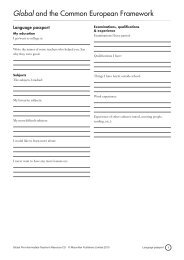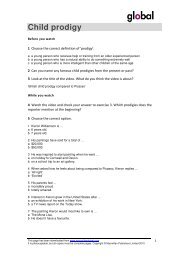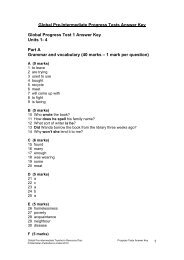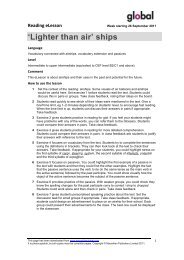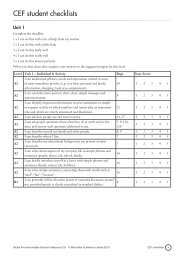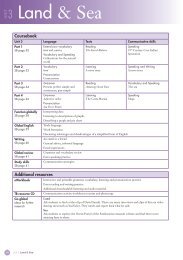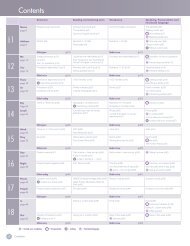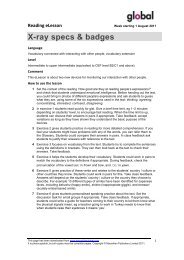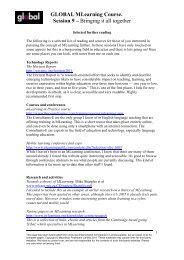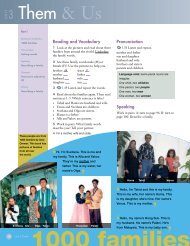Teacher's Book teaching notes - Global
Teacher's Book teaching notes - Global
Teacher's Book teaching notes - Global
Create successful ePaper yourself
Turn your PDF publications into a flip-book with our unique Google optimized e-Paper software.
UNIT4Hopes & FearsFunction globally: makingoffers and decisionsThese lessons in <strong>Global</strong> are designed to provide studentswith immediately useful functional language. They allfollow a similar format.Warm up (SB page 50)Aim: to introduce the topic via a quick speaking task orpicture work.Tips:• Do not over-correct here, especially in speakingactivities.• Encourage students to use what language they can atthis stage.Listening (SB page 50)Aim: to present the functional language in context via aconversation or series of conversations.Tips:• Ask students to read the questions first before listening.• Play the recording all the way through for each task(there are always two tasks).• For multiple conversations pause the audio after eachone.• If students find it very difficult, play the audio a finaltime and allow them to read the audioscript at the backof the book.1 and 2Conversation 1: situation 3. The bill is £2.75Conversation 2: situation 1. His friend is going to drive him.Conversation 3: situation 4. She is going to take the 6.50train.1.53–1.551 A: Oh. Look at the time. My train’s leaving soon.B: Shall I pay for these?A: That would be great.B: OK. Wait. I don’t have enough for both of them.A: Hold on. How much is it?B: 2.75.A: I’ll pay for it. Here’s five. I really have to go nowthough.B: Thanks again. Have a good trip, and see you nextMonday!A: Bye! See you Monday.2 A: Hey! What time do you need to get to the airport?B: I’m planning to be there two hours before the flight.Why?A: Well, look at the time. The airport train leaves in fiveminutes.B: Oh no.A: I’m sorry, we were talking and I didn’t see the time …B: No, don’t worry. I … I won’t take the train. I’ll take ataxi.A: A taxi? They’re quite expensive. Let me drive you tothe airport.B: Really? That would be great. Thanks.A: No problem. We can continue our conversation in thecar.3 A: Can I help you?B: Yes, thanks. Erm, I … I’ve missed my train. Can I usethis ticket for the next train?A: Yes, you can. The next train is the six o’clock fast train.You’ll need to pay an extra ten euros for that. Or youcan take the six fifty train and you don’t have to payanything extra.B: Okay, I’ll take the six fifty train then. Thank you.A: You’re welcome.Language Focus: offers and decisions(SB page 50)Aim: to draw students’ attention to the items offunctional language.Tips:• Make sure students have time to understand the formand meaning of the phrases, but you needn’t translatethem word for word.• Students should be able to pronounce these phrasesintelligibly, so drill them.1 will2 and 31.561 A: Are you ready to order?B: Yes. I’ll have a salad.2 A: I don’t understand this.B: That’s all right. I’ll help you.3 A: The next train is in twenty minutes.B: Shall we take it or wait?4 A: Here, let me take those bags.B: Thanks, but it’s OK. I’ll carry them.Speaking (SB page 50)Aim: to allow students an opportunity to use thislanguage in a meaningful, real-world context.Tips:• There are sometimes a choice of tasks. Any taskinvolving reading a script will be easier than a taskinvolving making students’ own scripts. This gives youflexibility for mixed ability classes.• Give students time to prepare this activity, andcirculate and monitor carefully.• Correct sensitively, paying attention to the targetlanguage especially.• If time allows, ask students to repeat the task, but witha new partner.54Unit 4 Hopes & Fears



